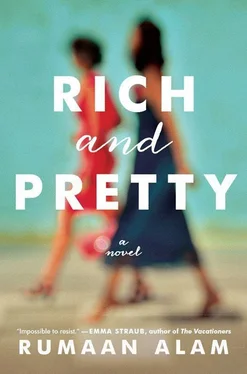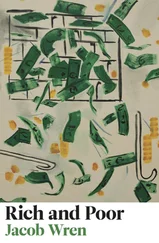Lauren can’t tell what’s warranted: handshake, half hug, kiss, sincere embrace. She tugs her tote bag over her shoulder and sort of hides behind it, protectively. “Hey!”
“God, you look beautiful, look at you!” The girl puts a hand on Lauren’s arm, a gesture that is clue enough — the implication of an intimacy now passed — and as their skins come into contact, Lauren remembers. Maybe it’s hormonal, animal, some secretion by which we can identify others of our species. Jill Hansen. Fraternal twin brother, Riley (fat, pale, much less pretty than Jill), elderly dad, and much-younger mother, from whom Jill had, fortunately, inherited a perfect, perfect nose, and of course, those cheekbones. Jill Hansen. Lauren hasn’t had occasion to imagine Jill Hansen in the past decade and a half, but they were friends, once. Lauren’s default attitude to these old acquaintances encountered on the street is usually disdain, so she’s surprised to discover she still feels warmly toward Jill Hansen.
“Jill. Wow!”
“It’s great to see you.” Jill Hansen’s eyes widen. She’s turned out to be one of those people who look better at thirty-two than at thirteen.
“You look amazing!” This is what you say, but Jill does.
“I don’t.” A dismissive wave. “But I’ll take it. I need to hear it. I just had our second, I feel like a corpse.”
“Your second!” Lauren’s at the age now where she’s required to affect enthusiasm about other people’s fecundity. She likes babies well enough but feels the false note in her own words.
“Yeah, do you have kids?” An excited edge in Jill’s voice: visions of playdates, the kids squirming in front of a movie, the husbands discussing whatever heterosexual men discuss with one another.
“Me? No, no kids.” She has a strange urge to proffer her hand, show there’s no wedding band there. How hetero-normative someone like Jill — an early adopter of veganism, who refused to wear leather shoes and organized a schoolwide letter-writing campaign in support of Mumia Abu-Jamal — would probably find that. “You have two!” Changing the subject.
“Leo, he’s four, and Audie, she’s two months.” She says it proudly, but doesn’t produce photographs.
“Two months. God, you do look amazing.” Lauren means it more now that she better knows the context. It’s hard to believe that Jill’s body, only eight weeks or so prior, produced the body of another human being.
Another dismissive wave. “So what are you up to?”
“Oh, I live around here,” Lauren says, answering a question different from the one that’s been asked.
“So do we! God, what a small world. We just bought over on Degraw; where are you?”
The conversation Lauren likes less than the conversation about children is the conversation about career and the conversation she likes still less than that is the conversation about real estate: original details, the expense of boiler repair, the logistics of adding a powder room on the parlor floor, the state of the local public schools and whether, a couple of years from now, they’ll have improved enough to be a viable option. If Jill Hansen’s cheekbones are her mother’s contribution, the three-million-dollar house on Degraw is probably her father’s doing. “Oh, over there,” Lauren gestures vaguely over her shoulder. “Have you been in the city all this time? All these years? And we’ve never seen each other even once?”
“I was out west for college. And that kind of stuck. But, we lost our dad, and Riley’s here, you remember my brother?”
“I do, of course.” Now it’s weird that she’s holding the tote bag to her torso like it was an infirm dog, and weird that they haven’t hugged. They were friends, once.
“He and his husband are here, too. We wanted to raise our kids close to each other.”
Lauren makes a somber face. “I’m sorry about your dad.” Condolences, though it was hardly a tragedy. She remembers more: Jill Hansen’s father was a doctor who had invented a mechanical device that fit into broken bodies to do the work of some piece of failed flesh. The family were zillionaires, not uncommon at school — a town house somewhere in the Seventies, an honest-to-God compound on the ocean out on Long Island, where her mother had been a party planner Doctor Hansen picked up at (where else?) a party. Jill had two half brothers who had to have been in their sixties by now.
“I appreciate that, thanks. Anyway, Portland was great, but we just wanted to be here. And we are loving Brooklyn!”
This last: like it’s Disney World.
“What about you? Do you still see anyone from school? You must still be friends with Sarah.”
“I am still friends with Sarah.”
“God, how is she?” A touch of awe, customary when discussing Sarah.
“She’s great! She’s getting married, actually.” Wonderful. Let’s talk about Sarah then.
“Amazing! You’ll have to tell her I said hello. And congratulations and all that. Wait, are you married?”
“Uh, no.” Lauren shakes her head, smiling to communicate that this isn’t a bad thing; her being unmarried is simply a thing. She needs another subject to change to, quickly. “You know, we should all get together some time.”
“I would love that,” Jill says, so enthusiastically it’s clear she’s misread the sincerity.
“Me too,” Lauren says and feels, suddenly, that she would, in fact, love it. Jill Hansen, maybe she’s been missing a Jill Hansen in her life. Lauren is not lonely, exactly, though she is often alone. She has Sarah to tell things to, yes, but no one to whom she might tell things about Sarah. She doesn’t actually believe Jill Hansen will fill this role — Jill Hansen will presumably be too busy caring for her offspring, though now that she thinks about it, where are those offspring, and why is Jill Hansen, a new mother, roaming the streets unencumbered? — but there is something unexpectedly appealing about the idea of the three of them, Sarah, Lauren, Jill, “getting together,” even as Lauren knows it will never happen.
Her mother’s dress is out of the question.Lulu and Huck married in 1970. Lulu, stick thin, twenty-four, gigantic eyes rimmed in mascara, an earlier marriage (an impulsive four-day union to a middling Mexican musician) annulled. Lulu, then as now, looked incredible. The pictures capture it vividly: chiffon, ruched and belted at the waist, an embellished collar up the neck, her long arms bare but for a gold cuff, the dress trailing to the floor but light enough that it’s drifting, seems to be moving even in the picture for which they posed. Huck’s suit, basic black and not altogether that dated, though the jacket was cut long, and the big tortoiseshell glasses feel very much a relic of the time, as do his sideburns. The picture has hung in the kitchen for Sarah’s entire life.
The dress must be somewhere: Lulu is sentimental. Nevertheless, it’s not for Sarah. The truth, unspoken but many times mulled over, is that she looks nothing like Lulu. An irony, that one, a missed opportunity: the great beauty whose genes turn out to be recessive. It doesn’t make Sarah laugh, even now, nor, though, does it make her cry. There’s little point in that. She’s her father’s daughter: as tall as him, the very same posture, the exact chin, the echoing laugh, the same way of holding a fork — that weird specificity of DNA. She’s learned Lulu: the cock of the head, the purposeful stride, the girlish tendency to touch her own hair, self-taught comportment, a secret project of Sarah’s when she was twelve. Of course, she’d known, much earlier than that, even, how genetics disappoint. Lulu’s hair, just like the hair on that disembodied bust of Barbie, a birthday present on which she was meant to practice the feminine arts, could be pinned up prettily, pulled over her shoulder casually, or folded into a lush, delicious chignon. Lulu wore it to her waist, once upon a time, a much younger woman, though now, in her sixties, it’s mannishly cropped, which has the effect of making her face appear even finer. Those drugstore elastics never seemed to do anything to Sarah’s hair but choke it, like a too-tight bandage that makes your finger swell.
Читать дальше












